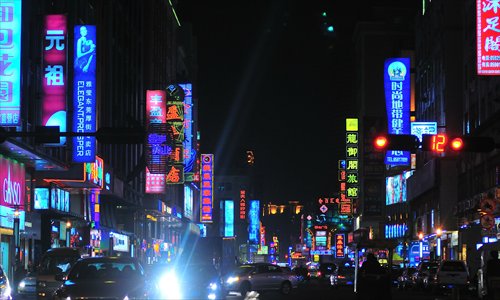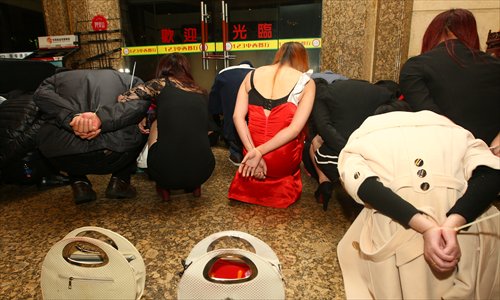Sex and the city

Hotels and entertainment venues prosper on a street in Dongguan, in January 2010. Photo: IC
The crackdown on prostitution in the southern Chinese city of Dongguan changed the city overnight from a throbbing nightlife hub to something resembling a ghost town.
Before, Dongguan was the city that never sleeps. Dubbed the country's "sex capital," much of the fun took place in saunas, hotels, massage parlors and karaoke bars, where drinks turned into entertainment and entertainment turned into the sex trade.
But all this was brought to an abrupt halt on the evening of February 9. On that night, over 6,700 police officers raided nearly 2,000 major entertainment venues and detained over 162 people, hours after China Central Television (CCTV) made the "Sin City" its main story.
Now, the doors of many saunas are sealed tight, karaoke bars and clubs are closed. Police on motorcycles patrol the streets and check hotels. It is reported that thousands of sex workers fled the city overnight.
Dongguan residents thought they had seen it all. Crackdowns like this have taken place at least three times in the past 10 years. Each time, the crackdown was announced quickly, but the pimps ran away faster; the raid hit hard, but sex workers worked harder; the campaign was strict, but the industry regulated itself more strictly.
But this time, the crackdown has been faster, deeper and stronger. The authorities announced a three-month crackdown on prostitution and vowed to stamp out the local "protective umbrella," widely believed to be the police. A week later, Yan Xiaokang, vice mayor and city's police chief, was sacked for "failing to clean up the sex industry."
Still, there are some questions that are yet to be answered. How can the local authority clean up the city's sex industry, which is estimated to generate an annual revenue of about 50 billion yuan ($8.2 billion), or one-10th of its GDP, and still maintain a constant 8-9 percent GDP growth at the same time? Or are outsiders overestimating the influence of the sex industry?

Sex workers and clients are held during a police crackdown in a Dongguan hotel on February 9. Photo: CFP
Perfect conditions
Dongguan has earned the title of "sex capital" for two reasons: its advantageous geographical position and relatively relaxed regulations on the sex industry.
Located to the east of the Pearl River Delta, the city is 50 kilometers south of the province's capital Guangzhou, and 90 kilometers north of Shenzhen. The city plays an important role connecting Guangzhou, Shenzhen and Hong Kong.
Its advantageous location also connects customers from neighboring cities and women factory workers who provide the services. Covering an area of 2,600 square kilometers, Dongguan is home to over 90 starred hotels, 21 of which are five-stars. As a "world factory," the city is also home to 6 million migrant workers, four times the number of permanent residents.
Prostitution is illegal in China, but factory cities like Dongguan have been famous for their sex industry since the late 1990s. It is estimated that there are at least 300,000 sex workers in this city.
Nevertheless, the CCTV investigation into the sex industry in Dongguan is hardly "news." What makes Dongguan stand out is its "Dongguan-style" service.
These days, low-class hair salons and street girls have disappeared as a result of previous crackdowns. They have been replaced by hotels, saunas and karaoke bars where sex workers are better regulated, a woman surnamed Yu who ran a brothel told the Global Times.
The city's sex industry has the edge over other places because of its "brighter service, brighter price." Most of the sex workers there receive "adult education," something akin to professional training. The prices range from 500 yuan to 1,000 yuan. A young sex worker can easily make 10,000 yuan a month.
Yu said that it is because the money is so easy to make that some young women would rather stay in this business than work in a factory. Moreover, the industry is so well organized that some places help the girls scan customers and give them regular health checks.
"We never force them to do anything they don't want to do. They come willingly and leave willingly," she said. "We even keep them away from drugs."
However, brothel madams like Yu are the target of the crackdown. Sex workers who get caught are released after up to 15 days of detention. While they might lose face when the police inform their families, if Yu got caught, she would face at least five years in jail for organizing prostitution services.
On February 9, Yu got a text message: "The wind is blowing," a code that told her a crackdown on prostitution was coming. Yu did not return to the sauna or her dorm after that, but moved to another town for "a long vacation."
"Dongguan has been home for me for years. I don't want to leave, but I don't know what to do next," she said. She added that many sex workers are still staying in the city, waiting for a good time to return to business.
Ye Haiyan, a well-known gender activist, expressed worries about the unemployment that the crackdown might cause.
"I never thought this crackdown would hit the industry so hard this time," Ye told the Global Times. "I worry that those hundreds of thousands of temporarily jobless pimps and sex workers might cause a social problem."
Public divided
For local authorities, what is more challenging than arresting pimps and sex workers is the public's attitude toward them.
Even though a recent Global Times survey found that up to 70 percent of 600 Dongguan residents said they support the crackdown on prostitution, slogans like "Dongguan, don't cry. Stay strong!", "We are all people of Dongguan tonight!" are widely circulating on Weibo, China's version of Twitter.
Many express doubts about the ongoing crackdown. Over 70 percent of 460,000 respondents said they think the campaign will not solve the problem, according to a survey conducted by sina.com and ifeng.com.
This is because when China opened up in the 1980s, many people embraced the economic reforms with an open mind. Over the years, the public has shown more tolerance toward extra-marital affairs and the sex trade.
According to the China Sex Report 2013, conducted by Timeout Beijing and Tencent's news portal, about 31.67 percent of 200,000 urban Chinese citizens said they would sleep with someone for money.
There have been repeated debates over the legalization of prostitution. Calls to legalize the industry have constantly been submitted to the country's parliament.
"Ironically, Japanese porn stars can be so popular in China, but Chinese prostitutes have to face crackdowns," Dongguan resident Chen Chang told the Global Times.
He said the sex industry does not bother ordinary Dongguan people's lives that much, and that the local government is overreacting.
"The police closed down almost all the bars and clubs on the bar street. Some of them don't even provide sex services," he said. "Now we have nowhere to go but watch TV at home."
Deeper concerns
Dongguan's flourishing sex industry exposed a deeper economic concern: how can the local government make up the GDP if the sex industry gets cleaned up?
"We will have to wait till the first quarter numbers come out in March," Nie Xin from the city's public relations department told the Global Times.
With last year's GDP rising 9.7 percent, the city expects 9 percent growth in 2014, according to the government's report. Nie denies that the sex trade makes up one-seventh of the city's GDP, but what is clear now is that many sectors linked with the sex trade, such as taxi drivers, restaurants and grocery stores, are all losing money.
In 2012, a few months after another anti-prostitution campaign, the hotel occupancy rate dropped 20 percent and the income of entertainment venues dropped 80 percent. Last year, the number of star hotels decreased from 99 to 90, according to finance.qq.com.
Zuo Ma, the owner of a flower shop near the city's bar street, told the Global Times that she lost almost 120,000 yuan in business due to the campaign on Valentine's Day, when police closed almost all the bars and clubs along the street.
"It took us a whole week to prepare those flowers for the bars and clubs," she said. "I wish the police could have informed us in advance."
Taxi driver Dai Dacheng told the Global Times that business is getting rough. "Usually, I can make several hundred yuan a night. Now, I'm lucky if I can make half that."
One thing is for sure: the anti-prostitution campaign has cast a shadow over the city's prospects of becoming the sixth "State plan-designated city," which would give it special status with regard to planning and budget, according to an insider from the local authority. Other cities on the list include Shenzhen, Qingdao and Dalian.
Nevertheless, neither local authorities nor sex workers saw this campaign coming at the beginning of the Year of the Horse. Perhaps the only one that did was the BBC, which marked the Chinese New Year with the now famous caption "Year of the Whores."